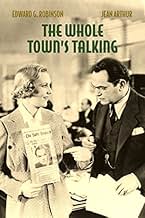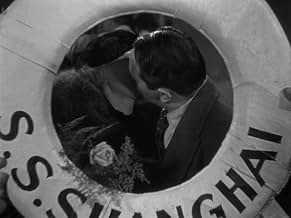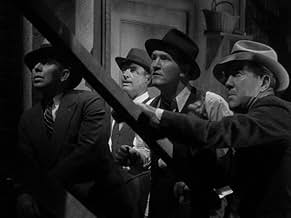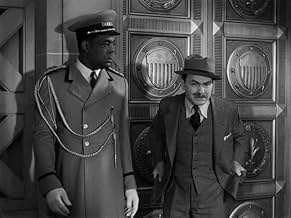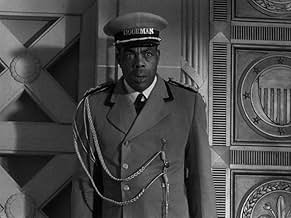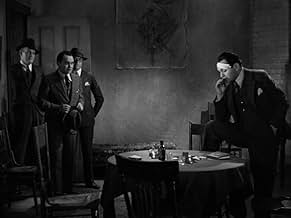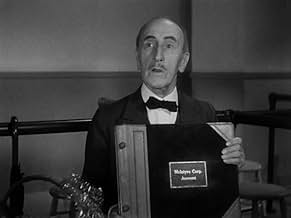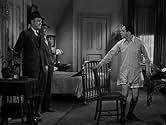NOTE IMDb
7,3/10
3,6 k
MA NOTE
Ajouter une intrigue dans votre langueA meek milquetoast clerk is mistaken for public enemy N° 1, and the notorious killer takes advantage of the situation.A meek milquetoast clerk is mistaken for public enemy N° 1, and the notorious killer takes advantage of the situation.A meek milquetoast clerk is mistaken for public enemy N° 1, and the notorious killer takes advantage of the situation.
- Réalisation
- Scénario
- Casting principal
Harry Abrahams
- Convict
- (non crédité)
Ernie Adams
- Reporter
- (non crédité)
Carmen Andre
- Clerk
- (non crédité)
Chester A. Bachman
- Policeman
- (non crédité)
Eddie Baker
- Policeman
- (non crédité)
Lucille Ball
- Bank Employee
- (non crédité)
H. Barnum
- Undetermined Secondary Role
- (non crédité)
George Barton
- Policeman
- (non crédité)
Avis à la une
Edward G. Robinson stars in "The Whole Town's Talking" along with Jean Arthur, Wallace Ford, and Donald Meek.
Edward G. Robinson was such a wonderful actor, a little guy with a towering talent. Here he has a dual role - that of an escaped criminal, Mad Dog Mannion and that of Arthur Jones, clerical worker, a shy man with a crush on a coworker (Arthur). When Mannion escapes from prison, his face is on the front page, and he looks so much like Jones that someone who sees him in a restaurant turns him into the police. When fingerprint ID verifies that he is not Mannion, he's given a letter by the police chief stating that he's not Mannion and should be left alone and even gets a job writing for the local newspaper about his experiences being mistaken for Mannion.
Unfortunately for poor Arthur, Mannion shows up and wants to use the pass, which he does, raising complete havoc. He also starts giving Arthur info for the news stories - and the police wonder how it is Arthur knows so much.
One of the funniest parts of the film for me was the newspaper description of Mannion - a cruel mouth, a Neandrathal face, etc., and poor Jones looking at himself in the restaurant mirror trying to look evil.
Robinson is fabulous - so sweet, so gentle, such a hard worker as Arthur and a ruthless killer as Mannion. Jean Arthur, as the outspoken Miss Clark is great - when she's questioned by the police, they assume she's Mannion's accomplice, so they keep asking her questions - who did this, who robbed that, and she keeps saying, using a tough, gun moll voice, "MANNION!" Then they find out it's not Mannion they caught after all.
I thought the movie went on just a tad too long, but otherwise, it was quite good, with fun performances, well directed by a man known for his westerns and bigger films, John Ford.
Edward G. Robinson was such a wonderful actor, a little guy with a towering talent. Here he has a dual role - that of an escaped criminal, Mad Dog Mannion and that of Arthur Jones, clerical worker, a shy man with a crush on a coworker (Arthur). When Mannion escapes from prison, his face is on the front page, and he looks so much like Jones that someone who sees him in a restaurant turns him into the police. When fingerprint ID verifies that he is not Mannion, he's given a letter by the police chief stating that he's not Mannion and should be left alone and even gets a job writing for the local newspaper about his experiences being mistaken for Mannion.
Unfortunately for poor Arthur, Mannion shows up and wants to use the pass, which he does, raising complete havoc. He also starts giving Arthur info for the news stories - and the police wonder how it is Arthur knows so much.
One of the funniest parts of the film for me was the newspaper description of Mannion - a cruel mouth, a Neandrathal face, etc., and poor Jones looking at himself in the restaurant mirror trying to look evil.
Robinson is fabulous - so sweet, so gentle, such a hard worker as Arthur and a ruthless killer as Mannion. Jean Arthur, as the outspoken Miss Clark is great - when she's questioned by the police, they assume she's Mannion's accomplice, so they keep asking her questions - who did this, who robbed that, and she keeps saying, using a tough, gun moll voice, "MANNION!" Then they find out it's not Mannion they caught after all.
I thought the movie went on just a tad too long, but otherwise, it was quite good, with fun performances, well directed by a man known for his westerns and bigger films, John Ford.
10Norm-30
Edward G. Robinson has been stereotyped to the nth degree as
THE "gangster" (even in Bugs Bunny cartoons!), so it's quite a surprise to see him in the role of a mild, meek clerk (who just happens to be a dead ringer for a gangster!).
The split-screen scenes (where he plays both parts) are excellent & "seamless", and the comedy is heightened by the utterly ridiculous lengths the police go to to catch the gangster!
In one scene, he (as the clerk) is eating lunch in a restaurant, is "spotted" as being the gangster, and within a matter of MINUTES the restaurant is surrounded by HUNDREDS of policeman, riot squads, & machine guns -- all to get the (wrong!) person!
A refreshing comedy; you've got to see this film, if only for Robinson's acting!
THE "gangster" (even in Bugs Bunny cartoons!), so it's quite a surprise to see him in the role of a mild, meek clerk (who just happens to be a dead ringer for a gangster!).
The split-screen scenes (where he plays both parts) are excellent & "seamless", and the comedy is heightened by the utterly ridiculous lengths the police go to to catch the gangster!
In one scene, he (as the clerk) is eating lunch in a restaurant, is "spotted" as being the gangster, and within a matter of MINUTES the restaurant is surrounded by HUNDREDS of policeman, riot squads, & machine guns -- all to get the (wrong!) person!
A refreshing comedy; you've got to see this film, if only for Robinson's acting!
Whole Town's Talking, The (1935)
*** (out of 4)
A timid, shy and all around weak store clerk (Edward G. Robinson) gets mistaken for a harden gangster (Robinson) but his new fame allows him to store writing a column in a newspaper about how gangster are weak without their guns. Soon the gangster shows up wanting more than just a little help. As a comedy this movie is a real masterpiece but as a drama, the final thirty-minutes or so really bring down a lot of the great moments. While watching this Columbia movie you can't help but wonder if this was originally meant to be directed by Frank Capra as it has his screenwriters and the small town story certainly seems like something you'd get from a Capra and not someone like Ford. To his credit, Ford does a great job with the comedy and really delivers one of the funniest movies of the 1930's. The problem happens in the third act when it really turns to too much of a gangster film and the laughs are pretty much forgotten. What holds both sides together is the terrific performance by Robinson. The way he plays the timid clerk is just downright hilarious and this includes a masterfully acted interrogation sequence where Robinson is nearly brought to tears because he's so scared. Seeing a tough guy like Robinson acting scared was just hilarious and one actually starts to feel sorry for the guy because it appears he's about to die. Robinson is also great in his second role as the gangster as he's as tough as ever and does manage to come off quite demanding and threatening. Jean Arthur is wonderful as well and adds many great comic scenes including her own interrogation where she keeps admitting to crimes that she has nothing to do with or even knows about. Arthur Hohl, Arthur Byron, Wallace Ford and Donald Meek round out the supporting cast. You can even see Joe Sawyer playing one of Robinson's goons. Again, I didn't care for the final act of the film as the comedy starts to not happen but that doesn't take away from everything at the start of the movie. Robinson has never gotten the credit he deserves as an actual actor, which is a real shame but this film allows for both sides of him to be highlighted and to great effect.
*** (out of 4)
A timid, shy and all around weak store clerk (Edward G. Robinson) gets mistaken for a harden gangster (Robinson) but his new fame allows him to store writing a column in a newspaper about how gangster are weak without their guns. Soon the gangster shows up wanting more than just a little help. As a comedy this movie is a real masterpiece but as a drama, the final thirty-minutes or so really bring down a lot of the great moments. While watching this Columbia movie you can't help but wonder if this was originally meant to be directed by Frank Capra as it has his screenwriters and the small town story certainly seems like something you'd get from a Capra and not someone like Ford. To his credit, Ford does a great job with the comedy and really delivers one of the funniest movies of the 1930's. The problem happens in the third act when it really turns to too much of a gangster film and the laughs are pretty much forgotten. What holds both sides together is the terrific performance by Robinson. The way he plays the timid clerk is just downright hilarious and this includes a masterfully acted interrogation sequence where Robinson is nearly brought to tears because he's so scared. Seeing a tough guy like Robinson acting scared was just hilarious and one actually starts to feel sorry for the guy because it appears he's about to die. Robinson is also great in his second role as the gangster as he's as tough as ever and does manage to come off quite demanding and threatening. Jean Arthur is wonderful as well and adds many great comic scenes including her own interrogation where she keeps admitting to crimes that she has nothing to do with or even knows about. Arthur Hohl, Arthur Byron, Wallace Ford and Donald Meek round out the supporting cast. You can even see Joe Sawyer playing one of Robinson's goons. Again, I didn't care for the final act of the film as the comedy starts to not happen but that doesn't take away from everything at the start of the movie. Robinson has never gotten the credit he deserves as an actual actor, which is a real shame but this film allows for both sides of him to be highlighted and to great effect.
John Ford directs a screwball comedy?? He does and quite well I may say. This is a story of a meek mild manner clerk named Ferguson(Robinson) who always gets stepped on and used. One day he is mistaken for "Killer Mannion". Mannion is a mean ruthless gangster who cares for no one. Ferguson is a sweet kind man who cares for beautiful Wilhelmina(played by Jean Arthur). Thanks to a police screwup, Mannion knows about Ferguson and is out to use him.
The script is cute and funny. It's also good in setting up the situation and the development of characters. It is not one of the best comedy ever made, but it is still very entertaining. The cast is first rate. Edward G does a terrific job at playing both the good AND the bad guy. Jean Arthur is funny as Eddie's wise cracking co-worker(check her out playing the "gangster moll"!) The other supporting characters are good too. The special effects showing both Robinsons on screen is quite good for it being 1935.
If you get a chance to see it, please do. It is a very cute film.
The script is cute and funny. It's also good in setting up the situation and the development of characters. It is not one of the best comedy ever made, but it is still very entertaining. The cast is first rate. Edward G does a terrific job at playing both the good AND the bad guy. Jean Arthur is funny as Eddie's wise cracking co-worker(check her out playing the "gangster moll"!) The other supporting characters are good too. The special effects showing both Robinsons on screen is quite good for it being 1935.
If you get a chance to see it, please do. It is a very cute film.
I don't think there's anyone who's ever seen The Whole Town's Talking and doesn't believe this was a film intended for Frank Capra. The mere fact that the screenplay was co-written by Robert Riskin who won an Oscar together with Capra for It Happened One Night the year before should give ample indication. If Capra had a choice between this and Broadway Bill he chose wrong.
Although this kind of comedy is not usually what is found in John Ford films, Ford does OK by it. I don't think he ever directed again anything that could be remotely classified as screwball comedy.
Edward G. Robinson who would make his second and last appearance in a Ford film 34 years later in Cheyenne Autumn, plays a dual role. He plays Killer Mannion in the tradition he established as Little Caesar and also A.L. Jones a meek, mild mannered clerk a type Robinson would play later in Mr. Winkle Goes to War.
Mannion's escaped from prison and there's a manhunt on for him, similar to the kind that was on for John Dillinger a year earlier. The police will simply shoot to kill. Bad luck for a guy that looks like Mannion and worse luck when Mannion finds out about his doppleganger and tries to make use of him.
Robinson is fine in his dual performance, but the film was a milestone for Jean Arthur who plays Robinson's fellow employee and despite his being a milquetoast, she sees something in him. Up to this point Arthur had played a lot of ingénues and loyal wives to leading men. This is her first role in a screwball type comedy that she became known for, in fact what she's remembered for mostly. Of course a year later, Harry Cohn did team her with Frank Capra and they certainly made some cinematic history.
My favorite two supporting parts are Etienne Girardot as Robinson's officious little office manager and Donald Meek another milquetoast who originally mistakenly turns in the clerk as the gangster and stays on the 'case.'
Though he's not in his element John Ford serves a nice piece of entertainment.
Although this kind of comedy is not usually what is found in John Ford films, Ford does OK by it. I don't think he ever directed again anything that could be remotely classified as screwball comedy.
Edward G. Robinson who would make his second and last appearance in a Ford film 34 years later in Cheyenne Autumn, plays a dual role. He plays Killer Mannion in the tradition he established as Little Caesar and also A.L. Jones a meek, mild mannered clerk a type Robinson would play later in Mr. Winkle Goes to War.
Mannion's escaped from prison and there's a manhunt on for him, similar to the kind that was on for John Dillinger a year earlier. The police will simply shoot to kill. Bad luck for a guy that looks like Mannion and worse luck when Mannion finds out about his doppleganger and tries to make use of him.
Robinson is fine in his dual performance, but the film was a milestone for Jean Arthur who plays Robinson's fellow employee and despite his being a milquetoast, she sees something in him. Up to this point Arthur had played a lot of ingénues and loyal wives to leading men. This is her first role in a screwball type comedy that she became known for, in fact what she's remembered for mostly. Of course a year later, Harry Cohn did team her with Frank Capra and they certainly made some cinematic history.
My favorite two supporting parts are Etienne Girardot as Robinson's officious little office manager and Donald Meek another milquetoast who originally mistakenly turns in the clerk as the gangster and stays on the 'case.'
Though he's not in his element John Ford serves a nice piece of entertainment.
Le saviez-vous
- AnecdotesThe $250.00 per week that Jones is to get for writing the article in this 1935 comedy translates to $4,999.23 per week in 2019 dollars.
- GaffesWhen Jonesy leaves his apartment in a rush he forgets to turn off the taps and his tub is (torrentially) overflowing. But when he returns from the police much later in the day there is no water anywhere.
- Citations
Arthur Ferguson Jones: You know something, a woman is only a woman, but a good cigar is a smoke.
- ConnexionsEdited into Michael Jackson's This Is It (2009)
Meilleurs choix
Connectez-vous pour évaluer et suivre la liste de favoris afin de recevoir des recommandations personnalisées
- How long is The Whole Town's Talking?Alimenté par Alexa
Détails
- Durée
- 1h 33min(93 min)
- Couleur
- Rapport de forme
- 1.37 : 1
Contribuer à cette page
Suggérer une modification ou ajouter du contenu manquant


